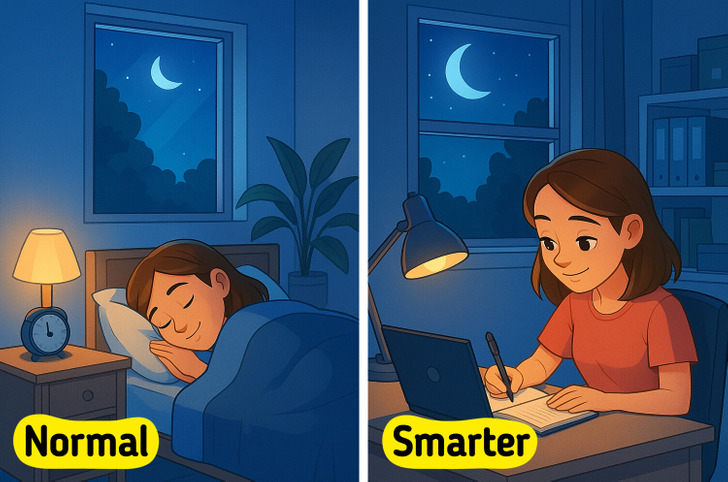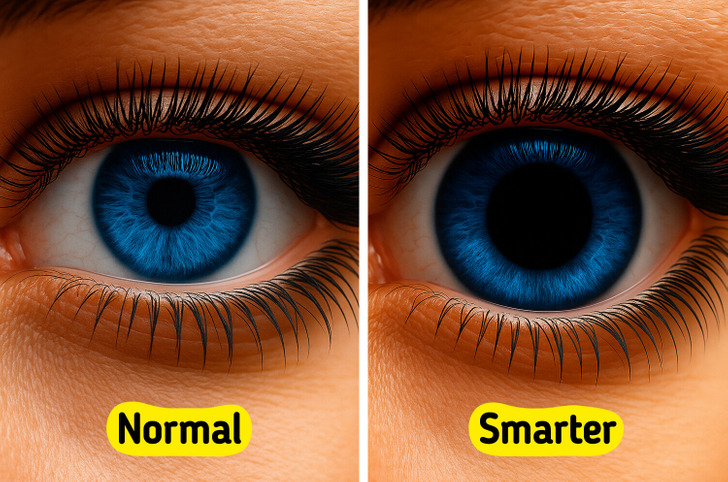The “Salt and Pepper” Trick Job Interviewers Use to Evaluate You


Intelligence isn’t just about solving equations or having a good memory. Today, we know, thanks to Howard Gardner’s theory of multiple intelligences and current cognitive psychology, that there are many forms of intelligence. Some are so subtle that they go unnoticed, even by the person who possesses them. In this article, we show you 12 research-backed signs that could indicate higher intelligence than you think, even if you’ve never been made to feel like “the brainiac of the group.”
Content is provided for informational purposes only and is not intended as a substitute for medical advice. Seek guidance from your doctor regarding your health and medical conditions.

A study by psychologist Satoshi Kanazawa revealed that people with higher IQs tend to go to bed later. This is because humans evolved to be diurnal, so changing that pattern involves independent, unconventional thinking. Going to bed late doesn’t make you lazy, but rather someone who is active when their creativity is ignited.
Far from being just insecurity, the habit of questioning and self-assessing is associated with a key metacognitive skill: reflecting on your own thoughts. This is essential for deep learning and adaptation. Furthermore, people with high IQs tend to underestimate their intelligence—the opposite of the Dunning-Kruger effect—which makes them more self-critical and perfectionistic. “I’m not good enough” is often a sign that you know exactly what needs to be improved.
Sarcasm involves handling ambiguity, reading emotions, and thinking laterally. According to a Harvard University study, people who use and understand sarcasm display more creativity and better problem-solving skills. In complex social contexts, understanding sarcasm is almost like having communication superpowers.

An experiment showed that those who work at messy desks tend to generate more creative and original ideas. Clutter, in this case, doesn’t reflect carelessness but rather a mind that prioritizes abstract connections over external control. A chaotic desk can be an incubator for brilliant ideas.
Psychologist Adam Grant argues that procrastination can serve as a creative incubator. By postponing tasks, intelligent people allow their subconscious to process ideas. Of course, we’re not talking about avoiding responsibilities, but rather about postponing in order to think better. It’s not laziness: it’s slow-burning thinking.
Verbal intelligence and humor are highly correlated, according to a study. Creating a joke involves thinking quickly, connecting unexpected ideas, and understanding the social context. Being funny isn’t superficial; it’s about solving social problems in real time.

Daniel Goleman defined emotional intelligence as the ability to recognize, understand, and manage emotions. Empathic people have a fine-tuned social reading and respond better in interpersonal situations, indicating a form of interpersonal intelligence, one of Gardner’s eight. Reading the emotional climate of a group is as complex as solving a math problem.
Intelligent people tend to have a heightened sensitivity to their surroundings: sounds, lights, other people’s emotions. But they also develop mechanisms to manage this overload. This heightened sensitivity is characteristic of what psychology calls “emotionally gifted.” You pick up on what others miss... and that can be exhausting, but also brilliant.
The need for constant stimulation leads intelligent people to seek out new challenges or to create when their environment doesn’t offer enough. Boredom can be a sign that the brain is craving more complexity. If you hate monotony, your mind is probably hungry for more.

A study found that people with higher IQs enjoy less frequent socializing, as their well-being is related to time for introspection and concentration. It’s not about being antisocial, but about needing space to think, reflect, or create. Your best company, often, is your own thoughts.
Some people think in images, patterns, or symbols rather than words. This is linked to high spatial or logical-mathematical intelligence. Engineers, architects, artists, and physicists often have this type of thinking. Seeing invisible connections is a way of reading the world that not everyone possesses.
Constant curiosity and the ability to learn independently are at the heart of intelligence. This intrinsic motivation to learn is more closely related to long-term success than IQ. You don’t know “everything,” but you know how to find out.

According to a study, the size of your pupil at rest may be linked to your intelligence. Researchers measured the pupils of more than 500 people (aged 18 to 35) while they looked at a dimly lit screen. They found that those with a larger pupil diameter scored higher on tests of fluid intelligence, working memory, and attention control.
This relationship is believed to be due to the functioning of the locus coeruleus, a small region of the brainstem that regulates attention, memory, and coordination between different areas of the brain. Having naturally larger pupils may reflect better regulation of this structure and, therefore, a more determined and alert mind.
Truly intelligent people sometimes don’t shout, they whisper. They can hide in your moods, your chaos, your doubts, or your sleepless nights. If you recognize yourself in these signs, maybe it’s time to embrace the silent intelligence that dwells within you and stop asking for permission to shine. And if you want to continue exploring how to boost your intelligence every day, we recommend this article, which will help you discover even more hidden signs that a person might be smarter than average.











